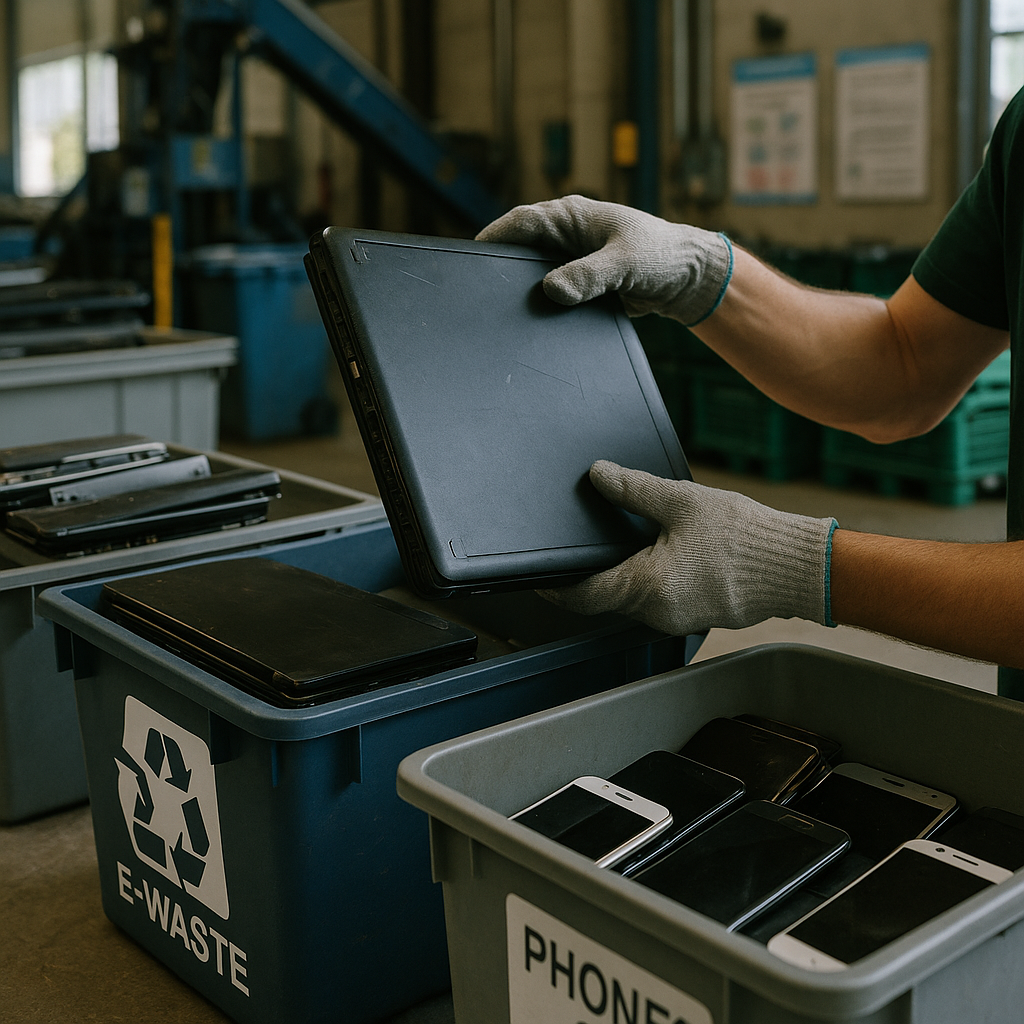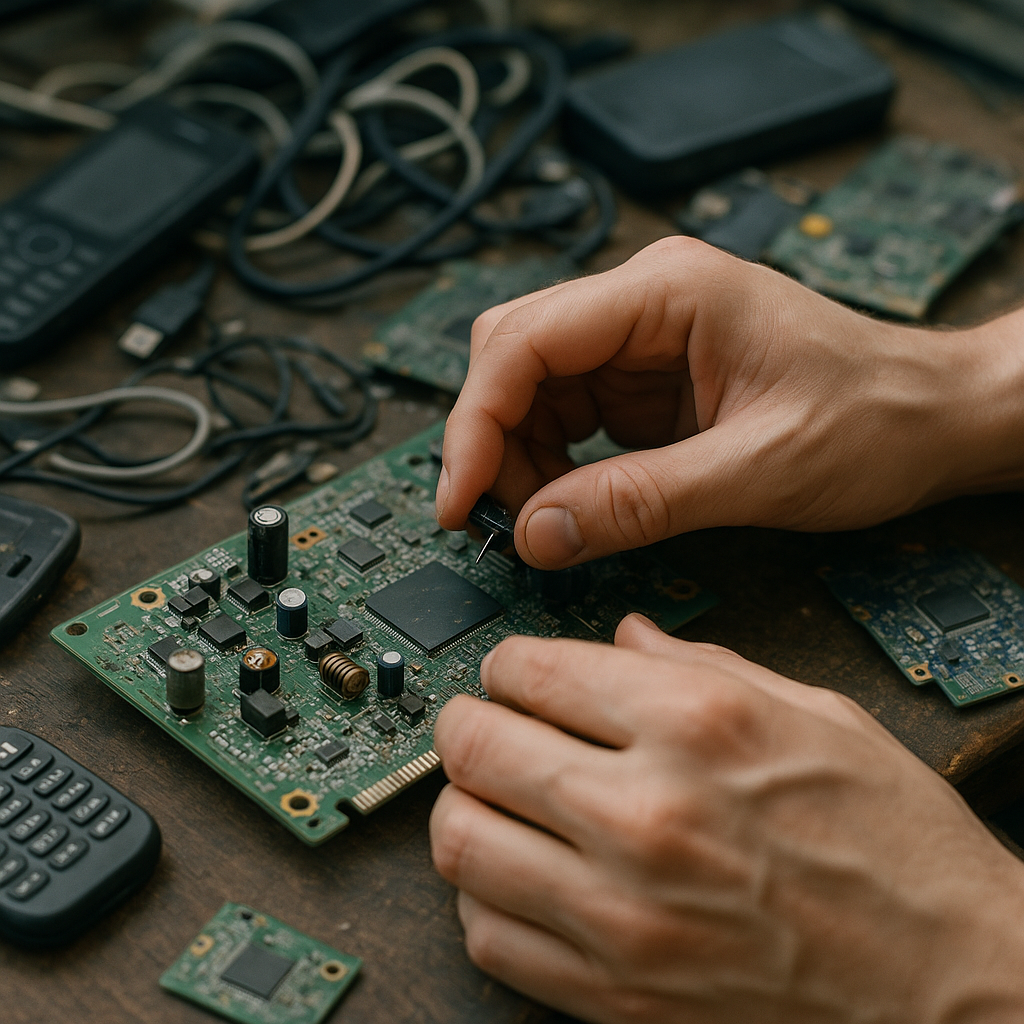5901 Botham Jean Blvd, Dallas, TX 75215
What Are End-of-Life Electronics and Why Should We Care?
July 9, 2025Every outdated smartphone stuffed in a drawer, every broken laptop collecting dust in the closet, and every obsolete television sitting unused in the basement are end-of-life electronics, commonly known as e-waste. These devices have outlived their usefulness due to damage, obsolescence, or replacement by newer models.
E-waste encompasses a wide range of products: computers, tablets, smartphones, televisions, printers, gaming consoles, and countless other electronic gadgets that are essential to modern life. When these devices reach the end of their functional life, they contribute to one of the fastest-growing waste streams globally.
Proper e-waste management is crucial. These discarded devices are far from ordinary trash; they contain valuable resources such as gold, silver, copper, platinum, and rare earth elements, which require significant energy to extract from the earth. They also contain hazardous materials like lead, mercury, and cadmium that can leach into soil and water if improperly disposed of. By recycling these materials instead of mining new ones, we conserve natural resources, reduce greenhouse gas emissions, and prevent toxic substances from contaminating our environment.
What Are the Benefits of Recycling End-of-Life Electronics?

Recycling end-of-life electronics offers significant environmental and economic benefits. The process conserves valuable resources and reduces our ecological impact. Let’s explore the specific advantages that make electronic recycling a vital part of sustainability efforts.
The energy savings from recycling electronics are considerable. According to the U.S. Geological Survey, recycling one million laptops saves energy equivalent to the electricity used by over 3,500 U.S. homes each year. This reduction in energy consumption leads to lower greenhouse gas emissions and decreased demand on power grids.
Material recovery is another key benefit. Electronic devices contain valuable metals that can be reclaimed through recycling. For every million cell phones recycled, we can recover 35,000 pounds of copper, 772 pounds of silver, 75 pounds of gold, and 33 pounds of palladium. These recovered materials reduce the need for environmentally harmful mining operations.
The conservation of rare earth metals is particularly crucial since these elements are in limited supply globally. By recycling electronics, we extend the availability of these critical resources for future technology production, contributing to a more sustainable supply chain for manufacturers.
Proper e-waste management also prevents toxic substances from entering landfills and water supplies. Electronics often contain hazardous materials like lead, mercury, and cadmium, which can leach into soil and groundwater when not disposed of correctly. Recycling ensures these materials are handled safely.
The economic impact of electronics recycling is equally noteworthy. The industry creates green jobs in collection, processing, and manufacturing. These employment opportunities support local economies while contributing to environmental protection goals.
How Can You Prepare Your Electronics for Donation or Recycling?
Properly preparing your electronics before donation or recycling is vital for environmental protection and personal data security. By taking the appropriate steps, you can safeguard your information and facilitate the recovery of valuable materials.
Consider Upgrading Instead of Replacing
Before buying a new device, evaluate whether upgrading your current computer or laptop could meet your needs. Adding memory, replacing the hard drive, or updating software can significantly extend your device’s lifespan.
Upgrading components is often more cost-effective than purchasing new equipment. It also reduces electronic waste by keeping functional devices out of the recycling stream longer.
For many computers, simple hardware upgrades can substantially improve performance. This approach conserves resources and reduces your environmental footprint.
Secure Your Personal Data
Data security should be your top priority when preparing electronics for donation or recycling. Simply deleting files is insufficient to protect your information.
Begin by backing up any important files you want to keep. Transfer photos, documents, and other personal data to an external storage device or cloud service.
For computers, use secure data-wiping software that overwrites your information multiple times. Standard deletion only removes file references while leaving the actual data recoverable.
For smartphones and tablets, perform a complete factory reset to restore the device to its original settings. Remember to sign out of all accounts before resetting.
Remove Batteries and Memory Cards
Batteries require special handling during the recycling process. Remove them from your devices before recycling or donation.
Lithium-ion batteries pose serious fire hazards if improperly disposed of. Never place these batteries in regular trash or recycling bins.
Also, remove any memory cards, SIM cards, or external storage media from cameras, phones, and other devices. These components can contain personal information and may require separate recycling.
Find Appropriate Recycling Facilities
Research certified e-waste recycling facilities in your area. Many retailers, like Best Buy and Staples, offer electronics recycling programs.
Local government waste management departments often maintain dedicated electronics collection points, ensuring proper handling of potentially hazardous materials.
Some manufacturers and retailers offer take-back programs for their products, typically following responsible recycling practices that protect both your data and the environment.
Where Can You Donate or Recycle Your End-of-Life Electronics?

Discovering the right place to donate or recycle your unwanted electronics is simpler than you might think. Numerous manufacturers and retailers now run take-back programs to manage their products’ end-of-life responsibly. Companies like Best Buy, Apple, Dell, and Samsung have introduced initiatives to assist consumers in disposing of outdated or broken devices correctly.
Several online resources offer straightforward ways to find recycling options in your area. Call2Recycle provides a searchable database for cell phones and rechargeable batteries. Earth911 offers extensive recycling information searchable by ZIP code for various electronics. Greener Gadgets also connects consumers with local programs for all types of electronics.
Many communities have dedicated e-waste collection centers designed to handle electronic waste safely, preventing harmful materials from polluting landfills. Local government websites often list permanent drop-off points and scheduled collection events. For example, Houston residents can dispose of unwanted electronics at designated city recycling centers year-round.
When choosing a recycling option, seek certified electronics recyclers. The EPA suggests using facilities certified under the Responsible Recycling (R2) Standard or the e-Stewards program. These certifications ensure recyclers uphold strict environmental standards and manage hazardous materials safely. Certified recyclers typically guarantee proper data destruction, safeguarding your personal information.
Before donating or recycling, remember to remove personal data from devices. Backup important files and perform a factory reset or use secure data wiping software. While some facilities offer data destruction services, doing this yourself adds an extra layer of protection.
Different electronics require various recycling approaches. Devices with lithium-ion batteries, like laptops and smartphones, need special handling to prevent fire hazards. CRT televisions and monitors contain lead and require specialized processing. Ensure your chosen recycler accepts the specific items you wish to dispose of.
Conclusion: Taking Responsible Action with End-of-Life Electronics
Properly managing end-of-life electronics is one of the most impactful environmental choices we can make today. The increasing volume of electronic waste poses significant challenges to our environment, with hazardous materials potentially contaminating soil, water, and air if improperly disposed of. By taking responsible action through proper e-waste management, we actively partake in resource recovery and conservation efforts, benefiting both current and future generations.
The path to responsible electronic disposal begins with understanding your options. Whether donating functional devices to extend their lifespan, utilizing manufacturer take-back programs, or finding certified recycling facilities in your community, each action contributes to a circular economy that values materials rather than wasting them. By properly preparing your devices—such as removing batteries, wiping personal data, and handling hazardous components with care—you ensure both your security and environmental protection are prioritized.
For all your electronics recycling needs, contact Okon Recycling at 214-717-4083. Our professional team will ensure your end-of-life electronics are handled responsibly, with proper data destruction and environmentally sound recycling practices that keep harmful materials out of landfills while recovering valuable resources.
